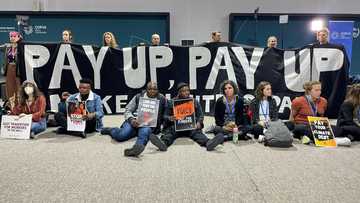Inflation-wary US consumers flock to 'Black Friday' deals

Source: AFP
US shoppers are out in force for "Black Friday," but inflation nerves have left them jittery, analysts say, prompting retailers in the world's biggest economy to come up with ever more deals.
As markets and consumers eye possible turbulence during the transition from President Joe Biden to Donald Trump, there are hopes that the year's biggest shopping season -- stretching from Thanksgiving to Christmas -- will be a bonanza.
The National Retail Federation (NRF) said a record 183.4 million people are planning to shop over the weekend, ticking up from 182 million last year and 18.1 million higher than 2019, before the Covid pandemic derailed the global economy.
The so-called "Black Friday" discounts day originated as a single day when shoppers poured -- sometimes stampeded -- into malls in search of incredible deals.
Now the discount window extends through to "Cyber Monday" and the less dramatic online component is huge. Adobe Analytics said this year "consumers will spend a record $10.8 billion online for Black Friday" -- up nearly 10 percent from last year.
But even with inflation largely tamed from the earlier post-Covid shock, Americans are wary.
Holiday shoppers in 2024 are "even more preoccupied and very focused around value and discounts," said Vivek Pandya, leading insights analyst at Adobe Digital Insights.
"We do see stronger price sensitivity on the part of the consumer and they are very responsive to deals and event-tie deals," he said.
The Federal Reserve's favored inflation gauge ticked up to 2.3 percent in the year to October, latest figures show.
Though price increases are moderating, consumers are paying on average 22 percent higher in August 2024 compared with pre-pandemic-crisis period up to January 2020, according to Pew Research.
Discontent with high costs was seen as one of the main reasons Trump defeated Vice President Kamala Harris in the presidential election this month.
The pressure has steered shoppers into ever new strategies, such as turning out for Target's "Circle Week" savings events held about once every quarter.
After a lengthy period of inflation, "consumers tell us their budgets remain stretched," Target CEO Brian Cornell told analysts earlier this month.
"They're becoming increasingly resourceful in their shopping behaviors, waiting to buy until (the) last moment of need, focusing on deals and then stocking up when they find them," he said.
Incomes 'edging up'
But economists have pointed to an easing of gasoline prices as a supportive factor, along with an ebbing in the costs of some food items.
The NRF has projected holiday spending growth of between 2.5 and 3.5 percent in the 2024 season compared with the year-ago period, to as much as $989 billion over the two-month period.
The inflationary environment has weighed especially heavily on households with lower incomes, with banks pointing to rising charge-off rates as an indicator of increased stress.
But budget-conscious retailer Burlington Stores is seeing some of the strongest sales in low-income zip codes, said Chief Executive Michael O'Sullivan.

Source: AFP
"Maybe for the first time since 2021, it looks like their real incomes are finally edging up," O'Sullivan said on a conference call this week.
Thanksgiving, which is always the fourth Thursday in November, falls on its latest possible date in 2024. As a result, retailers are pivoting to a shopping season with five fewer days than last year.
Pandya, the insights analyst, said the shorter season may be one reason for the outsized early sales, but that it also reflects how the competitiveness for online goods that drives down prices.
PAY ATTENTION: Сheck out news that is picked exactly for YOU ➡️ find the “Recommended for you” block on the home page and enjoy!
Source: AFP




